OXFORD UNIVERSITY: Using AI to improve refugee integration

Using machine learning and optimisation to find refugees’ new homes can significantly improve their chances of finding work within three months, according to new research.
The international collaboration, conducted by researchers at the Universities of Oxford and Lund, Sweden as well as the Worcester Polytechnic Institute, involved developing Annie MOORE, an AI-powered software. The tech uses complex computational tools to match refugees to a given location by their needs, skills and the number of available resources and opportunities available.
The software not only optimises the likelihood of someone finding employment within three months, by over 20 percent, but also significantly improves the chances of them settling into – and therefore becoming a benefit to, the wider community. Although the main measure of a successful settlement is an individual finding a job, the software also ensures that the needs of refugees, such as whether they need language support or are perhaps a single-parent, are met.
Dr Alex Teytelboym, co-author and Associate Professor of Economics, said: ‘Refugee resettlement is a complex humanitarian problem that cannot be solved with a single quick-fix. The manual resettlement process was riddled with issues, not least the sheer volume of cases that are processed each week – we are talking hundreds. This does not give the organisations enough time to thoroughly think about where and why they place a refugee family.
‘Technological solutions, like our AI powered software, remove many of these issues from the process, offering great opportunity and the potential for profound societal impact.
‘The software takes on the bulk of the work of figuring out straightforward placements while drastically improving refugee outcomes. This fast-track approach means that the resettlement staff can then focus more time on supporting refugees with issues such as mental health, long-term conditions, and previous trauma etc., for whom it is often harder to find good placements. Our software retains complete control for the resettlement agency staff by simply giving them recommendations of placement according to the criteria that they themselves set.’
Originally developed for use by the non-profit organisation HIAS in the United States, where it has been trialled with success since May. Staff have reported that the automatic approach saves them wasting valuable time on straightforward placements, so they can focus on more complicated cases and enhancing the likelihood of a match being successful.
Should they be dissatisfied with the match suggested by Annie, staff still have the option of overriding the recommendation with a manual selection.
Of the 496 refugees that HIAS has resettled in 2017, 159 were able to secure some form of employment. However the data shows that had they used Annie to automatically match refugees to new homes, over 200 – or over 20 percent more – would have found a job in this time. There was potential to increase the refugee employment rate by as much as 37 percent.
Due to the current state of immigration and asylum seeking policy in the US, the team do not currently have enough data to evaluate how the programme has performed overall in 2018.
Dr Teytelboym said: ‘the software was trained on data collated under the Obama administration, from 2010-2016, President Obama pledged to increase the US refugee intake from 70,000 to 110,000 alongside commitments from 50 other heads of state in September 2016. However, the new President has accepted the lowest number of refugees for many years. Next year, the US has pledged to resettle only 30,000 refugees. Given there are 17 million refugees worldwide and over a million that require resettlement, this is a tragic situation. Nevertheless, we are ready to support any agency in the US or any country, such as the UK with its Syrian Vulnerable Persons Resettlement Scheme, in improving their resettlement processes.
It is the team’s vision that with further research, this work can be adapted to support other countries, with their refugee resettlement and integration goals, such as the UK and Sweden.




